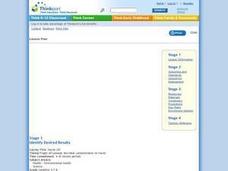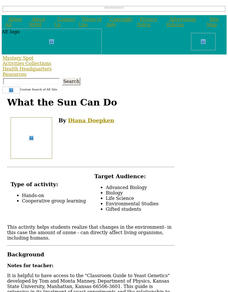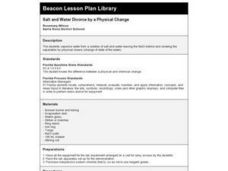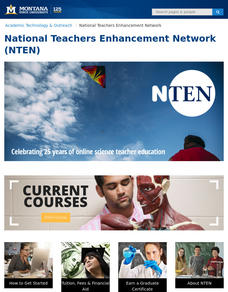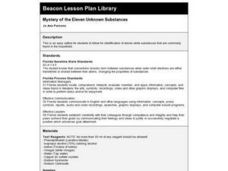Curated OER
Hands Off
Students perform a handwashing experiment to see if a difference can be detected in the number and types of microbes on our hands after various types of cleaning. They will also demonstrate that they have learned the whys and hows of...
Curated OER
Animals of the Fire Ice
Students study ice worms and describe how they interact with other species. In this methane hydrate lesson students study ice worms and hydrate shrimp to learn their behavior and can participate in an optional activity.
Curated OER
What's the Big Deal?
Students explore and define methane hydrates and describe ways that it can impact their own lives. For this methane hydrate lesson students create a molecular model and research methane hydrate.
Curated OER
What the Sun Can Do
Students develop and test a unique, personally-relevant hypothesis about the consequences of exposure to UV radiation based units on a living organism, common baker's yeast (Saccharomyces cerevisiae).
Curated OER
Beneficial Bug Scavenger Hunt
Learners identify several beneficial insects and spiders, including predators and pollinators. They search an outdoor environment and record numbers and types of beneficial insects and spiders that they discover.
Curated OER
Smoothing Out the Rough Spots
Fifth graders experiment to observe the changes created on a surface by mechanical action of water with varying amounts of mineral content and abrasive qualities. They write the predictions of their outcomes and describe all of their...
Curated OER
Clouds: an Internet Based Lesson Plan
Students watch a teacher demonstration of cloud formation. They research cloud formation on the Internet to write reports that summarize the process of cloud formation.
Curated OER
How Old Is This Tree?
Students work in pairs to determine the age of a tree using two different methods in this experiment. They collect data about how trees change over time.
Curated OER
Lead Extraction
Students investigate one method used in the detection of lead in the soil. They use a Lead Check Soil Kit to safely obtain results in 30 minutes or less in levels of 400 ppm or above. In addition, they write a brief description of what...
Curated OER
A Whirlwind Tour
Students explore volcanoes, hurricanes, and tornadoes through the use of the Internet.
Curated OER
ABC's of Dinosaurs
Students develop an ABC Book using KidPix Productivity software to create a multimedia slide show applying all they have learned about dinosaurs. They participate in a virtual field trip to find information.
Curated OER
Salt and Water Divorce by a Physical Change
Pupils discuss the definitions of physical and chemical properties and changes. They vaporize a solution of salt and water, observing the sodium chloride that is left behind.
Curated OER
Lights On - We Have A Quorum
Students explore basic bacteriological techniques. They investigate cell to cell communication and become aware of the environmental and evolutionary implications of this communication.
Curated OER
New Jersey Estuaries
Students experiment to discover that salt water is denser than fresh water by creating color coded solutions. They examine how heavy rainstorms and high tides develop layers of different degrees of density.
Curated OER
Lost Baby
Students simulate the steps involved in creating a DNA fingerprint by the RFLP technique. They analyze RFLP patterns to determine the parentage of a missing baby.
Curated OER
Which Colors Absorb the Most Energy?
Learners measure the temperatures over time of different colored envelopes in order to explore the different rates at which each color absorbs energy from a heat lamp. They record their data and graph their results.
Curated OER
Making Your Own Sampling Tools
Students begin a class recycling project. They create data sampling equipment using their own designs and test them in the field.
Curated OER
Our Food and Microorganisms
Students answer questions about how microorganisms can affect our food supply and how they can be controlled. The first set of inquiry activities are directed by the teacher. Subsequent activities are based on students generating their...
Curated OER
A Very Simple Conductivity Meter
Students conduct a simple conductivity meter to test the ionic or non-ionic nature of water samples including one from their home.
Curated OER
The Effect of Moisture on Soil Temperature
Young scholars analyze the relationship between soil moisture and its effect on soil temperature.
Curated OER
Conservation Station
Second graders, in groups, measure the volume of four containers that vary in shape and size.
Curated OER
Mystery of the Eleven Unknown Substances
Fourth graders identify eleven white substances that are commonly found in the household. They, in pairs, perform experiments on a variety of substances, and must identify them based on the reactions they observe.
Curated OER
Polymer Physics on the Playground
Students investigate what materials allow them to slide down a slide the fastest. They set up test procedures and carry out an experiment.
Curated OER
CULTURING PLANTS FROM EMBRYONIC PLANT TISSUE
Students use this laboratory exercise as a growth medium that contains the macronutrient and micronutrient needs of plants. They observe the effects of different hormones on tissue cultures and must use variations of the basic growth...


